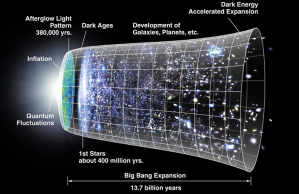
As creation theories continue to be proven and disproven by scientists, researchers from Egypt and Canada have agreed on a new theory that states that the universe had no beginning and the Big Bang probably didn't happen.
"The Big Bang singularity is the most serious problem of general relativity because the laws of physics appear to break down there," co-creator of the new model, Ahmed Farag Ali from Benha University and the Zewail City of Science and Technology, both in Egypt, told Phys.org in a recent interview.
Using updated geodesic data and new variables, the researchers basically reconfigured the physics behind the previous quantum equations to come up with a new model that they believe more accurately shows the history of the universe according to the laws of science. In this model, a fluid-like graviton substance (dark matter and dark energy) is thought to make up the universe with no real mass or gravity, leading to no finite size or age of the universe.
Of course, as believers, this isn't exactly news to us. Psalms 90:2 tells us, "Before the mountains were brought forth, or ever thou hadst formed the earth and the world, even from everlasting to everlasting, thou art God." And later on in Psalms, chapter 93 verse 2, we read, "Thy throne is established of old: thou art from everlasting."
God is the Alpha and the Omega, meaning that he is and always will be. This is certainly an impossible idea to fathom, which explains why we, as humans, spend so much time and energy (and taxpayer money) trying to figure out the logical possibilities, even if they're as far-fetched as the origins of life happening from a big "bang." When someone doesn't believe in the Word of God, they seek the answers that are unexplainable except through Him.
But in the traditional Big Bang's theory of cosmic expansion that was first considered in 1927, scientists believe that a single point of origin existed around 13.8 billion years ago, and everything we know (and everything we don't know) has been created from that expansion. This theory was backed up by notable researchers such as Edwin Hubble, who, only two years later in 1929, discovered that galaxies seemed to be drifting apart. And of course there's Albert Einstein's General Relativity Theory that describes accelerated motion in gravitation to help explains the universe's expansion rate.
But this latest research seems to show the one thing that has stumped scientists since the Big Bang Theory was developed: how did it all start? The Big Bang Theory explained (to scientists) what happened directly after the universe began its expansion, but there was never a timeline for how that singularity began in the first place.
Again, it seems like a silly argument for believers in God's Word because creation and eternity is explained all throughout the Bible, but this latest theory may work toward the idea that science can't simply explain everything. Once that idea is established, many atheist scientists might even admit that an intelligent designer may actually exist.
It's a step in the right direction, at least.







